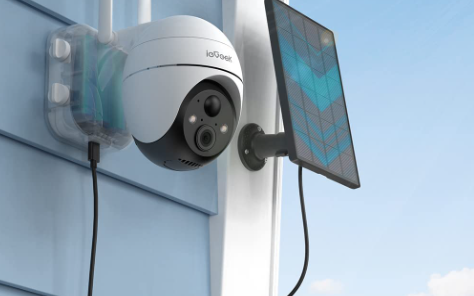
Taking the plunge into improving your home security through installing security cameras is a worthwhile investment, and can actually be done relatively inexpensively in 2023. Thanks to a huge boom in the wireless security camera industry, securing your home can be done from as little as a couple of hundred pounds, or even less if you only need a single camera set up.
Naturally there are a load of questions that come with security cameras. From where you are legally allowed to position them to how long you should retain footage, this article aims to cover every commonly asked question a homeowner is likely to have relating to security cameras.
- Is It Illegal to have CCTV Inside Your House?
- Do All Security Cameras Need Wi-Fi?
- Is it Better To Have Wired or Wireless Security Cameras?
- How Safe Are Wireless Security Cameras?
- Can Someone Turn Off My Security Camera?
- Should I Hide My Security Cameras?
- Does Home CCTV use a Lot of Electricity?
- How Far Back Can Police Check CCTV?
- Is It Better To Have Indoor or Outdoor Security Cameras?
- Do Solar Powered Security Cameras Work in England?
Is It Illegal to have CCTV Inside Your House?
No, it’s not illegal to install security cameras inside your house. People are perfectly within their right to have security cameras and smart doorbells installed on their property. Ideally, you should aim to ensure that neighbour’s homes and public spaces are not being recorded, but in a lot of cases this isn’t possible of course.
Do All Security Cameras Need Wi-Fi?
Not all security cameras require a Wi-Fi connection to be installed. Many CCTV cameras have the ability to record to some kind of local storage, which means that you do not require Wi-Fi to run them.
Is it Better To Have Wired or Wireless Security Cameras?
Wireless security cameras tend to be slightly cheaper and easier to install than wired cameras, but if you’re looking for a more long term system with around the clock recording and crystal clear footage, then opting for a more premium wired system with multiple cameras may make more sense for you. Generally for the purpose of monitoring an average UK house, wireless cameras are more than enough for most people’s needs.
How Safe Are Wireless Security Cameras?
Generally, wireless security cameras are as secure as the other Wi-Fi enabled devices connected to your home network. This is why it’s important to secure your home network before setting up security cameras.
Do Security Cameras Stop Burglars?
According to ADT, installing security cameras makes your home 300% safer against break-ins than homes without security cameras. This is why it’s essential to install them in almost all cases. The main reason for homes being safer is simply that cameras act as a great deterrent – criminals are a lot more likely to be caught if they are recorded breaking in.
Can Someone Turn Off My Security Camera?
Yes, if your network is not properly secured then it’s possible in theory for a hacker to intercept the network and control the cameras. It’s important to make the necessary steps in order to secure your internet connection. Take a look at this guide here to learn how to secure your home’s network.
Should I Hide My Security Cameras?
Security Cameras which are in busy places and easily accessible are at risk of being damaged by criminals. It can be good to have cameras on view to act as a deterrent though. One way to have hidden security cameras but still deter criminals is to put up a CCTV recording sign such as this to warn people.
Does Home CCTV use a Lot of Electricity?
Most modern home security cameras are fairly energy efficient. In fact, some of the best wireless security cameras use so little power that they can run from their in-built batteries for several weeks. Even mains-powered cameras with 24/7 monitoring are generally energy efficient enough that you would barely notice an increase in your electricity bills.
How Far Back Can Police Check CCTV?
31 days is the time period for which most security camera users will keep their footage, which is also the amount of time the police recommend. For more on this, check the Government website for the specific details and guidelines that CCTV owners are recommended to follow.
Is It Better To Have Indoor or Outdoor Security Cameras?
Outdoor security cameras tend to be better made and higher quality than indoor security cameras, but are also more expensive. When it comes to fitting cameras, generally a mix of outdoor and indoor cameras is ideal, making sure to respect the privacy of everyone living in the house.
Do Solar Powered Security Cameras Work in England?
Yes. Despite our often questionable weather, solar powered security cameras do work in England. The new solution which makes a lot of sense is that these cameras have an inbuilt battery which powers the camera, with the solar panel charging the battery. This means even when there is not enough sun, the security camera can continue to work without any hassle. If the camera does somehow run out, which is unlikely, in most cases you can simply plug a wire in momentarily and charge the camera.
Conclusion – In Almost All Cases, Installing CCTV is Worth It.
From massively reducing the chances of a break in to improving the safety of your home, security cameras have a huge number of benefits, and are absolutely worth installing in almost all homes, especially in the UK where our crime is notably bad and police are lacking in resources.
If you’re looking to opt for a great solar powered outdoor security camera, I’ve made a list of my favourites which you can check out over here. Alternatively, if you are looking to install a great security camera system without needing to pay for an app subscription, check out our top options here.
